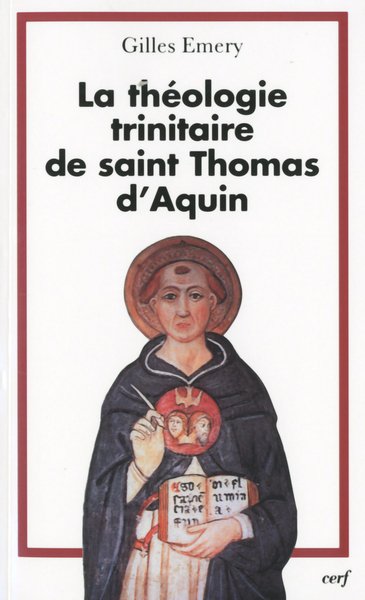- EAN13
- 9782204074810
- Éditeur
- Cerf
- Date de publication
- 6 janvier 2005
- Collection
- THEOLOGIE
- Nombre de pages
- 513
- Dimensions
- 23,4 x 14,5 x 4,2 cm
- Poids
- 705 g
- Langue
- fre
La Théologie Trinitaire De Saint Thomas D'Aquin
Gilles Emery
Cerf
Prix public : 39,00 €
Pour saint Thomas d'Aquin, la connaissance de la Trinité est la source et l'accomplissement de toute la vie chrétienne. Contempler la Trinité, dans la foi, c'est recevoir un avant-goût de la vision bienheureuse de Dieu, objet de l'espérance. Pour en rendre compte, le théologien met en oeuvre toutes les ressources dont l'intelligence croyante peut s'aider : exégèse biblique, tradition patristique, réflexion philosophique, théologie spéculative. À la façon d'une initiation, ce livre offre une introduction à la théologie trinitaire de Thomas d'Aquin et une explication des principales questions du traité trinitaire de la « Somme de théologie ». Il s'adresse aux étudiants et à tous ceux qui, avant d'entrer dans la lecture des articles qui composent ce traité, ou à l'occasion de l'étude de certaines questions, souhaitent bénéficier d'une présentation générale qui indique les enjeux des principaux problèmes examinés, la raison de l'attention qu'on leur prête, les débats historiques qui leur sont liés ainsi que les voies explorées et proposées. Cette initiation à la théologie trinitaire de Thomas d'Aquin explique tout d'abord la méthode de sa réflexion, sa structure et l'intention qui l'anime. Elle expose ensuite les notions fondamentales qui permettent de tenir un authentique monothéisme trinitaire : les processions, les relations et la personne. Ces questions préparent l'étude du Père, du Fils et du Saint-Esprit saisis dans la propriété spéciale qui les distingue et dans leur mutuelle intériorité. Les trois personnes divines sont alors manifestées dans leur communion éternelle et dans leur agir en notre faveur. L'exposé fait découvrir la nature contemplative de la réflexion de Thomas d'Aquin, son personnalisme, la place centrale qu'il reconnaît aux relations personnelles et les rapports étroits qu'il observe entre l'être éternel de la Trinité et son agir dans le monde. La dernière partie présente l'enseignement sur l'agir créateur et sauveur de la Trinité, puisque tel est le motif de la révélation de la Trinité suivant Thomas d'Aquin : nous donner une juste notion de la création et du salut que le Père accomplit par son Fils dans l'Esprit Saint.--For Thomas Aquinas, an understanding of the Trinity is the source and accomplishment of all Christian life. To contemplate the Trinity, in faith, is to receive a preview of a blessed vision of God, the object of our hope. To understand this, the theologian deploys all the resources available to intelligent faith: Biblical exegesis, patristic tradition, philosophical reflection, speculative theology. In the form of an initiation, this book offers an introduction to Thomas Aquinas's theology of the Trinity, as well as an explanation of the main issues raised in the treaty on the Trinity included in the ‘Theological Synthesis'. It is intended for students and all those preparing to read the articles that constitute the treaty, or those studying specific questions who would like a more general presentation that explains the challenges of the main problems examined: why they receive such attention the historical debates linked to them and the paths of investigation they explore and propose. Thomas Aquinas's initiation into the mystery of the Trinity firstly explains the method, structure and aims of his reflection. It goes on to reveal fundamental notions on which we can found an authentic monotheism of the Trinity: processions, relations and the person. These questions prepare the way to study the Father, the Son and the Holy Spirit, seized in the specific property that distinguishes them and in their mutual interiority. The three divine beings are manifest in their eternal communion and in their action on our behalf. This book enables us to discover the contemplative nature of Thomas Aquinas's work, his personalism, the central place he accords to personal relations and the close rapports he observes between the eternal being of the Trinity and its action in the world. The concluding section provides teaching on the creative and redeeming action of the Trinity, because this, according to Saint Thomas Aquinas, is the purpose of the revelation of the Trinity: to give us a precise notion of the redemption and creation accomplished by the Father through his Son in the Holy Spirit.


















